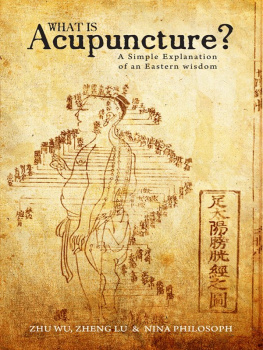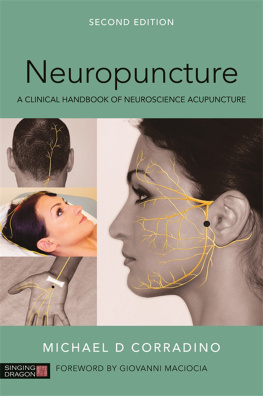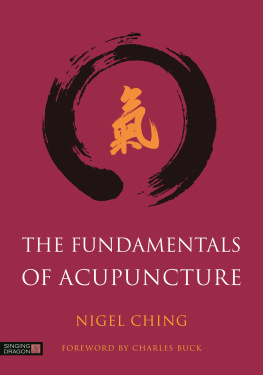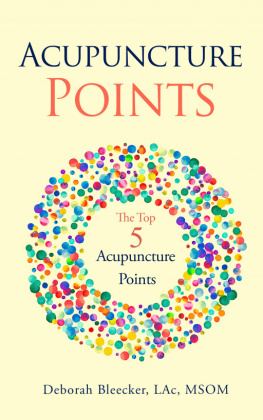Zhu Wu - What is Acupuncture?: A Simple Explanation of an Eastern Wisdom
Here you can read online Zhu Wu - What is Acupuncture?: A Simple Explanation of an Eastern Wisdom full text of the book (entire story) in english for free. Download pdf and epub, get meaning, cover and reviews about this ebook. year: 2011, publisher: BookBaby, genre: Religion. Description of the work, (preface) as well as reviews are available. Best literature library LitArk.com created for fans of good reading and offers a wide selection of genres:
Romance novel
Science fiction
Adventure
Detective
Science
History
Home and family
Prose
Art
Politics
Computer
Non-fiction
Religion
Business
Children
Humor
Choose a favorite category and find really read worthwhile books. Enjoy immersion in the world of imagination, feel the emotions of the characters or learn something new for yourself, make an fascinating discovery.
- Book:What is Acupuncture?: A Simple Explanation of an Eastern Wisdom
- Author:
- Publisher:BookBaby
- Genre:
- Year:2011
- Rating:4 / 5
- Favourites:Add to favourites
- Your mark:
- 80
- 1
- 2
- 3
- 4
- 5
What is Acupuncture?: A Simple Explanation of an Eastern Wisdom: summary, description and annotation
We offer to read an annotation, description, summary or preface (depends on what the author of the book "What is Acupuncture?: A Simple Explanation of an Eastern Wisdom" wrote himself). If you haven't found the necessary information about the book — write in the comments, we will try to find it.
Zhu Wu: author's other books
Who wrote What is Acupuncture?: A Simple Explanation of an Eastern Wisdom? Find out the surname, the name of the author of the book and a list of all author's works by series.
What is Acupuncture?: A Simple Explanation of an Eastern Wisdom — read online for free the complete book (whole text) full work
Below is the text of the book, divided by pages. System saving the place of the last page read, allows you to conveniently read the book "What is Acupuncture?: A Simple Explanation of an Eastern Wisdom" online for free, without having to search again every time where you left off. Put a bookmark, and you can go to the page where you finished reading at any time.
Font size:
Interval:
Bookmark:

Copyright 2012 Zhu Wu, Zheng Lu, Nina Philosoph
ISBN: 9781922022073 (ebook)
Published by Vivid Publishing
Fremantle, Western Australia
www.vividpublishing.com.au
No part of this publication may be translated, reproduced, or transmitted in any form or by any means, in whole or in part, electronic or mechanical including photocopying, recording, or by any information storage or retrieval system without prior permission in writing from the copyright owner. The publisher disclaims any liabilities or responsibilities whatsoever for any damages, libel or liabilities arising directly or indirectly from the contents of this publication.
As Traditional Chinese Medicine practitioners, we achieve only a portion of what we are capable of. Very often we are limited by peoples lack of understanding of what TCM and acupuncture can offer. For people who are accustomed to modern Western medicine they may approach us to treat specific ailments and expect specific results during a single treatment. Although seemingly more subtle on the surface, TCM can offer so much benefit to ones health and wellbeing. However, in order for results to be fully realised the client needs to understand more about TCM both to allow the time and conditions for treatment to take effect and also to take a more active role in their own health through simple lifestyle adjustments.
If a client stops treatment at the first sign of improvement, while addressing the surface issues, this approach doesnt allow time to treat the problem in its entirety and eliminate the root cause. Given a few more treatments a much deeper level of healing can be reached, thereby guarding against a recurrence. Given this expectation of immediate results from the client, a practitioner often does not have the time needed to explain nor treat with the thoroughness required to truly heal.
While Western medicine can use strong drugs which can often overpower symptoms immediately, TCM operates on a philosophy of creating the optimal environment for the body to support its own healing. TCM works more collaboratively with the body for long term healing as opposed to dominating it in the short term to achieve immediate but often unsustainable relief. Without this understanding and participation from clients is difficult for a practitioner to achieve the best results for their clients.
The modern world recognises acupuncture and TCM as a complementary technique used to supplement western medicine in the face of illness. This framework overlooks a key aspect of TCM which is about maintaining ongoing good health throughout ones lifetime. Our aim is not only to broaden your view of acupuncture and TCM, but also to enable you to understand your body more clearly as it communicates to you through subtle symptoms and signals. It is through addressing these signs at the early stages that we prevent illness and disease, achieve optimal health and are able to live each day to its fullest.
We hope this book will help both those who do not know much about acupuncture and TCM and also for those who want to know more and gain a deeper understanding of the topic. While some people think Acupuncture and TCM work mysteriously, we want to explain some of the secrets behind that mystery. As people better understand TCM so will they be able to achieve improved health through being in harmony with the laws of nature.
The Tibetans say that health is like flowing water and illness is water turning to ice; it blocks the flow of the water, preventing energy from reaching and nourishing the body. When an area is ill or frozen it can be hard to penetrate directly. The area is tense and is naturally inclined to contract in a form of self protection. By working indirectly to strengthen the associated and surrounding systems TCM enables the body to heal itself in a more natural and holistic manner.
TCM works to strengthen the waters flow which naturally melts the ice while Western medicine works to remove the ice.
Traditional Chinese Medicine Turns our vision inwards, teaches us to get in touch with our bodies needs, line with nature etc
Philosophy
TCM philosophy is based on the balance between body and nature. Harmony with the environment brings us closer to our true nature and our deeper self.
For the last few hundred years the vast majority of society has been working to find ways to improve the conditions that our environment provides for us through dramatic changes in technology and lifestyle.
Natures cycles have not changed significantly for thousands of years yet we try to overpower them in the belief that we are improving our quality of life. We have created means of preserving food through refrigeration, overcoming changes in weather with air conditioners and heaters and being active during night hours with the help of lights.
What we lack is the realisation that we are a part of nature and that by fighting it we are damaging our own well-being. We need to realise that we are a part of the natural world and aim to flow within its energy rather than attempt to dominate it. The western mind views nature in the same way a child might think their parent is depriving them when in actual fact the parent is only wishing to protect them. A child thinks a parent unfair for sending them to bed but the parent knows that without good nights sleep the child will suffer the following day.
While we have begun to address our impact on the environment many of us have not yet made the connection that nature is perhaps the greatest expert on the health of our species.
Lifestyle & diet are the two elements which most affect our balance with nature. Like animals, we too should allow nature to guide our diet and our behavioural responses to the changing environmental elements.
Animals follow the cycles of nature as a guide and within each species behave in remarkably similar ways; eating the same foods, mating during the same seasons, sleeping and waking at similar times. We would not find one animal in its natural habitat staying up much later than the rest of its group simply because they are feeling rebellious.
Proactive approach to health
Illness brings about uncertainty in our bodies and lives and can create distress and instability while leading a healthy life promotes stability and peace of mind. TCM takes a proactive approach to health, promoting lifestyle habits to prevent ill health, disease and the stress and distress, which accompany such states. In this way TCM is not only an avenue to explore once our health is compromised but also a guide for maintaining good health and a good life.
Chinese people of the more traditional lifestyle often live in great health until the time of their death. They do not necessarily live longer due to their lifestyle habits but their quality of life is often better for a larger portion of their life. They suffer far less from the health issues that we in the West simply accept as being a part of the ageing process.
The reason for this is that they lead simple lives, which are in closer accordance with natures laws and cycles.
- They eat the food that nature provides within each season and not foods which have been stored in supermarket cool rooms for months.
- They use the sun and moon to guide their sleeping habits instead of the constant use of artificial light to overcome what the west sees as natures limitations.
- They engage in steady and consistent daily activity while many westerners shock their body as they shift between the two extremes of prolonged sedentary office work and intense gym sessions.
Font size:
Interval:
Bookmark:
Similar books «What is Acupuncture?: A Simple Explanation of an Eastern Wisdom»
Look at similar books to What is Acupuncture?: A Simple Explanation of an Eastern Wisdom. We have selected literature similar in name and meaning in the hope of providing readers with more options to find new, interesting, not yet read works.
Discussion, reviews of the book What is Acupuncture?: A Simple Explanation of an Eastern Wisdom and just readers' own opinions. Leave your comments, write what you think about the work, its meaning or the main characters. Specify what exactly you liked and what you didn't like, and why you think so.






